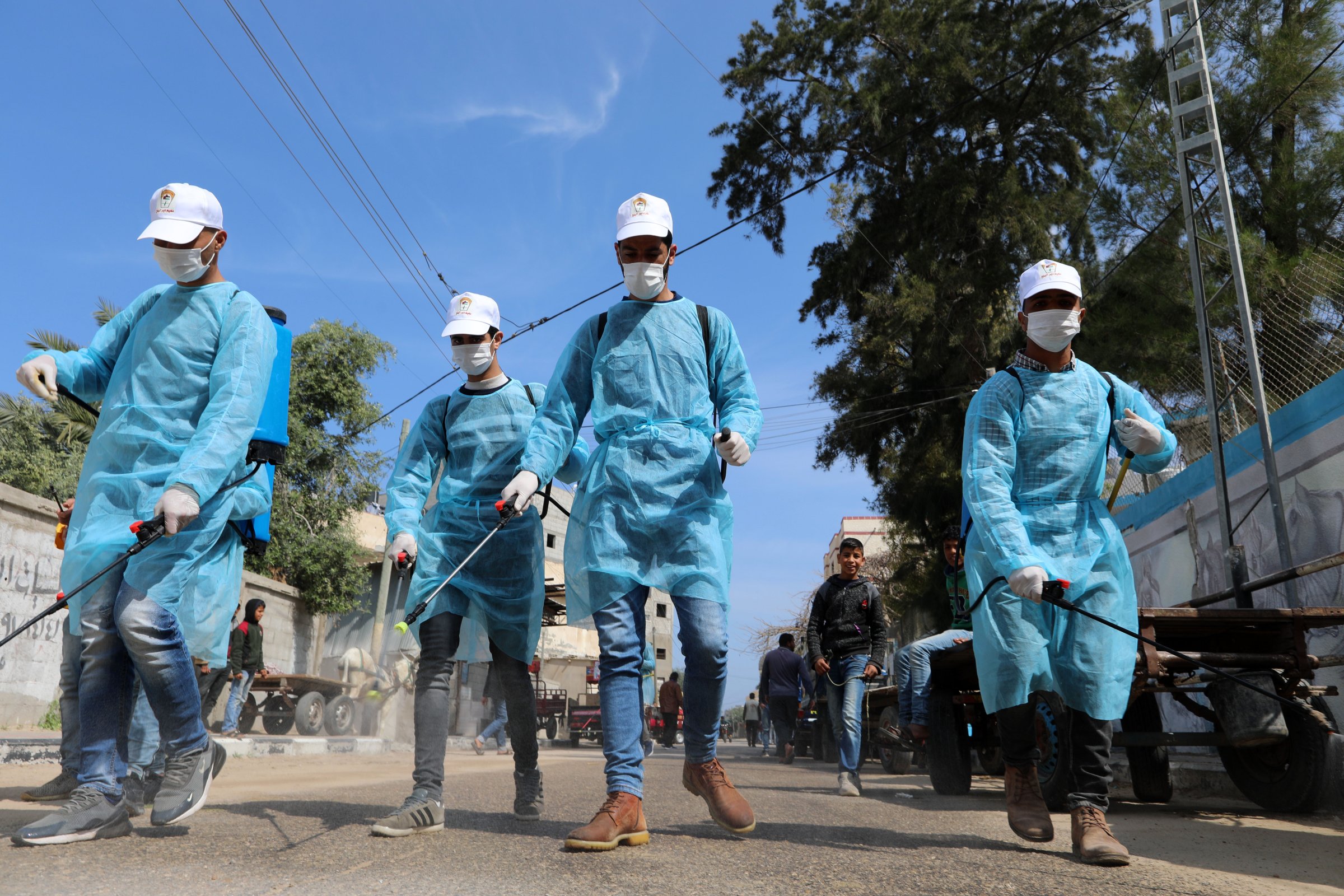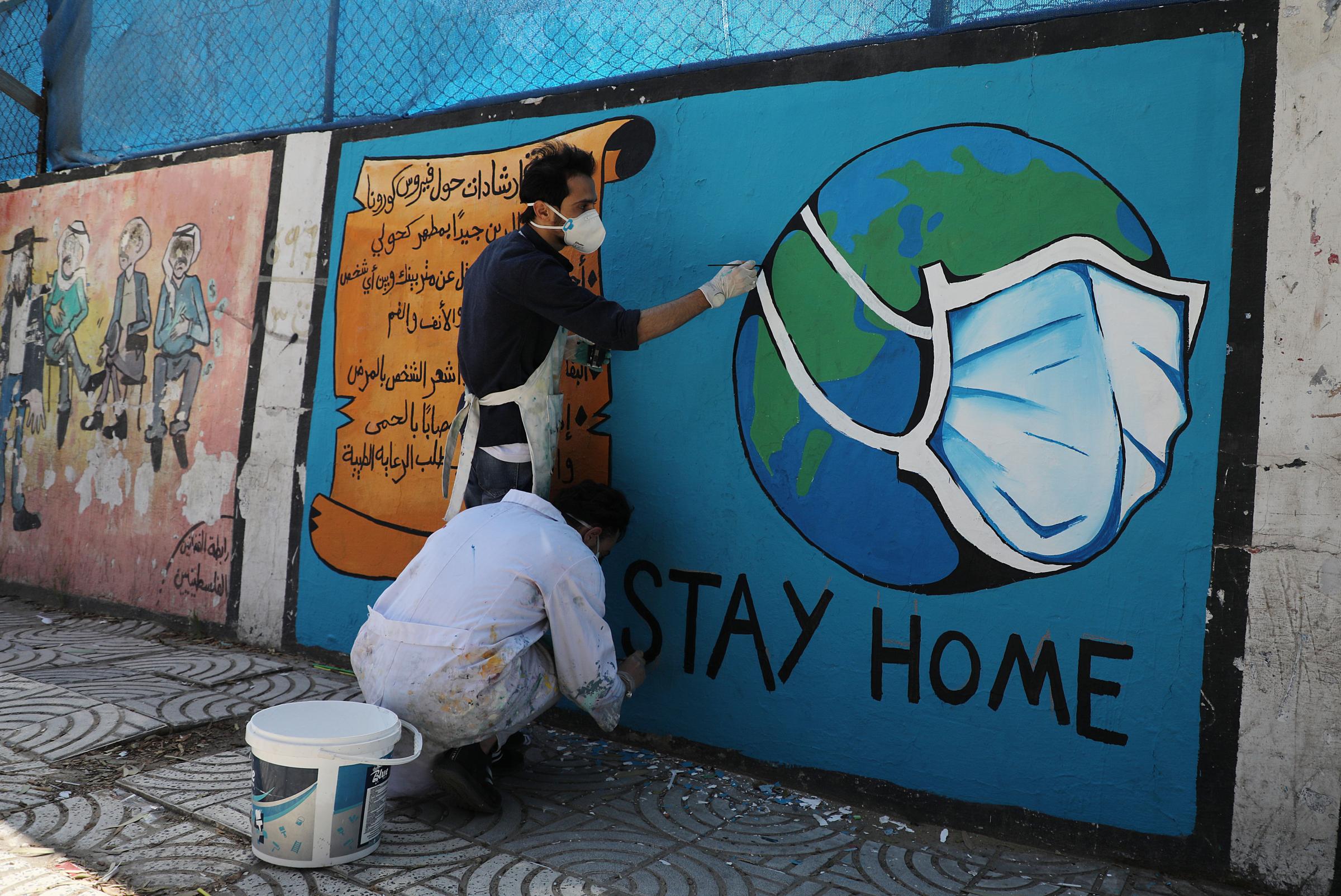
Salam Khashan is acutely aware of the devastation a coronavirus outbreak would wreak on the Gaza Strip. Since the 25-mile long Palestinian territory confirmed its first two COVID-19 cases on March 22, the 29-year-old family doctor and her colleagues have been preparing for a large-scale outbreak of the highly infectious virus in one of the world’s most densely populated and impoverished places.
At the Nasser medical complex in Khan Yunis where Khashan works, local positive cases would activate a new staff rotation system, with doctors working 14-day shifts, followed by 14 days in quarantine—the virus’s incubation period—before being allowed to return home. New triage centers have been set up to receive ambulances and determine which patients need hospitalization. And a planned shift towards teleconsultations will soon allow Khashan to conduct some appointments remotely.
But in a territory where mains electricity is often available for less than half the day, and where there are fewer than 100 ventilators to serve a population of around 2 million people, Khashan acknowledges that no amount of preparation will be sufficient. “We don’t have enough hospitals, or ICU beds, or mechanical ventilators. I understand those facts,” she tells TIME by phone on March 31. “If we have a positive case in the community, it will be a disaster.”
Gaza’s health system “is already overstretched, already at its limit,” says Ignacio Casares, head of the International Committee of the Red Cross (ICRC) sub-delegation to Gaza. “It is unable to absorb the impact of an aggressive pandemic like COVID-19.” The “critical shortage of test kits, ventilators, drugs, and medical consumables,” heap pressure on Gaza’s densely packed population, he says, with those in refugee camps (run by UNRWA, the main U.N. agency providing aid to Palestinian refugees) especially at risk from COVID-19. In Israel, which pulled out of Gaza in 2005 but retains responsibilities for the 140-square mile enclave under international law, senior security officials have warned that a local coronavirus outbreak would constitute a “god-help-us” scenario.
Despite the dire projections, that scenario is yet to arrive. As of April 3, Gaza had recorded only 12 COVID-19 infections: far fewer than Israel, which has in excess of 6,800 cases, or the 750-plus cases in neighboring Egypt, whose authorities have been accused of grossly underestimating infection rates.
Experts say such underreporting is unlikely in Gaza. The dozen Gazans diagnosed with COVID-19 were all either recent returnees from abroad already in isolation when they were diagnosed, or members of security forces staying with those returnees at quarantine centers.
While it’s impossible to entirely rule out undetected infections in the wider community, rigorous contact tracing means “the number of positive cases we are seeing right now might give us the right picture,” says Gerald Rockenschaub, Head of the World Health Organization’s office for the occupied Palestinian territory.
Such a low case rate is a function of Gaza’s isolation. In 2007, after the militant group Hamas violently expelled the Palestinian Authority from the Strip, Israel and Egypt imposed an air, land, and sea blockade that for almost 13 years has restricted the movement of people and goods in and out of the territory.
Israel says the restrictions it places on an exhaustive list of “dual-use” items—whose contents range from chemical fertilizers, to aluminum poles, to steel cables, to water skis—are necessary for maintaining security against a hostile military group that frequently launches missile barrages across its borders. But critics of the policy—which has at times restricted goods as quotidian as cilantro—insist it has transformed Gaza into “the world’s largest open-air prison.”
For now, an instrument the U.N.’s Human Rights Council says is being used for “collective punishment” is Gaza’s principal bulwark against the coronavirus. The irony is not lost on Khashan. “For the first time in our lives, the blockade gives us an advantage,” she says. Still, the poverty it has exacerbated makes it difficult for her to convince patients to stay at home: “If people do that, maybe they can escape the coronavirus, but they can’t escape the lack of supplies or the lack of food.”

Israel’s leadership and the Palestinian Authority (PA), which administers the occupied West Bank, both moved rapidly to contain the novel coronavirus, which as of April 3 had killed 37 people in Israel and one person in the West Bank.
Israel’s embattled Prime Minister Benjamin Netanyahu was among the first world leaders to implement mandatory quarantining for all arrivals. And after the discovery of COVID-19 cases in the West Bank city of Bethlehem, the PA also moved quickly to impose a lockdown. Israel and the PA established a joint command center to manage the crisis, and the U.N.’s Special Coordinator for the Middle East Peace Process has praised Israel’s and the Ramallah-based Palestinian leadership’s cooperation as “excellent.” Hamas’s relationship to Israel, however, appeared to remain business as usual. Despite the pandemic inducing a lull in violence, Gaza-based militants in March fired rockets into Israel, prompting retaliation from the Israel Defense Force.
Yet no amount of preparation could prevent the pandemic from battering Israel economically. Around a quarter of Israelis are now out of work, up from about 5% at the end of 2019, Joshua Krasna, a former Israeli diplomat tells TIME. Polling by the Jerusalem-based Israel Democracy Institute suggests that two-thirds of Israelis are now worried about their economic future, with Arab-Israelis—who constitute a disproportionate number of those in poverty—the most concerned.
While no such surveys exist in Gaza, economic anxiety is widespread. Even before the pandemic, about half of Gaza’s population was living in poverty, including some 400,000 children. When rare protests against Hamas erupted last year, demonstrators held aloft placards bearing slogans such as “revolt of the hungry.” and Gaza’s weekly March of the Return demonstrations along Israel’s border—at which Palestinians demanded the right to return to their ancestors’ homes—have also highlighted the strip’s dire economic conditions.
Those conditions have contributed to a healthcare system woefully underprepared for a pandemic. In addition to the paucity of ventilators and other medical equipment, Gaza has only around 120 ICU beds, says ICRC’s Casares—and most are already occupied by non-COVID-19 patients. “We are asking the UN and the international community to give us immediate support, including ventilators and intensive care equipment to deal with the epidemic,” Gaza’s Health Ministry spokesman Dr. Ashraf al-Qudra told a press briefing on March 24.
In the past, much of the funding supplied to the UN agency that supports the Palestinians came from the U.S. But those funds have dried up under President Trump’s White House. Cutting financing to UNRWA is only one of several long-held U.S. positions on the Israeli-Palestinian conflict Trump has reversed. In January, he released his son-in-law and special advisor Jared Kushner’s long-delayed “Middle East Peace Plan,” which greenlights Israel’s annexation of swathes of West Bank territory.
Although the U.S. Congress last year allocated $75 million in humanitarian assistance for Palestinians in 2020, the White House has not allowed that aid to be delivered, despite the pandemic. On March 27, a group of Democratic Senators wrote in a letter to Secretary of State Mike Pompeo that providing coronavirus relief to Gaza and the West Bank would not only be in the interest of the Palestinian people but also “in the national security interest of the United States” as well as that of “our ally Israel.”
But Jon Alterman, director of the Middle East Program at the Center for Strategic and International Studies, tells TIME there is little chance of the Trump administration reversing course on aid to the Palestinians, despite the prospect of high numbers of COVID-19 related deaths.
“When I’ve spoken to administration officials, they’ve argued that the Palestinians are responsible for their own conditions and the opportunities are there for the Palestinians to ameliorate their own conditions,” by cooperating politically with Israel and Washington, he says. “I have continuously heard Israeli and U.S. officials reject responsibly for Palestinian suffering and put the blame on the Palestinian leadership,” adds Alterman, a former State Department official.
The WHO’s Rockenschaub tells TIME that “we see very positive cooperation from the Israeli side” in terms of facilitating the entry of essential supplies into Gaza. But as recently as February, the WHO had officially accused Israel of obstructing Palestinians’ access to vital medicine. On April 1, Israel’s hawkish Defense Minister Naftali Bennet linked future support for Gaza’s coronavirus mitigation efforts to the recovery of two Israeli soldiers lost during the 2014 war, Reuters reports.
Unless she’s asked directly, Dr. Khashan does not tell her patients about the dire lack of ICU beds, ventilators, personal protective equipment, and medication in Gaza.
In consultations, the family doctor advises her patients to focus on “things we can control, like washing of hands, not touching your face, and social distancing.” In houses where water and electricity are erratic, shared by up to 13 relatives, such advice can be difficult to implement. But “you have to do what you can,” Khashan tells her patients. “You have to deal with what you have.”
Braced for a coronavirus outbreak in a system ill-equipped to contain it, it’s also a principle with which she also abides. “I have many choices. One of them is to worry and to cry,” Khashan says. ‘At the same time, I have the choice to stand up and work and do my best. And that’s what I’m going to do.”
With reporting by Kimberly Dozier / Washington D.C.
More Must-Reads From TIME
- The 100 Most Influential People of 2024
- Coco Gauff Is Playing for Herself Now
- Scenes From Pro-Palestinian Encampments Across U.S. Universities
- 6 Compliments That Land Every Time
- If You're Dating Right Now , You're Brave: Column
- The AI That Could Heal a Divided Internet
- Fallout Is a Brilliant Model for the Future of Video Game Adaptations
- Want Weekly Recs on What to Watch, Read, and More? Sign Up for Worth Your Time
Write to Joseph Hincks at joseph.hincks@time.com